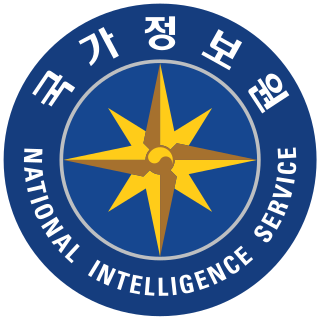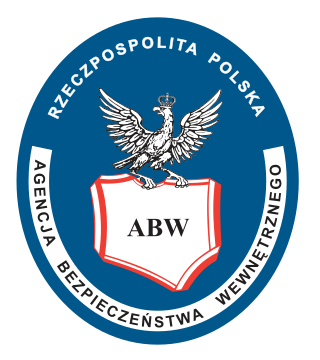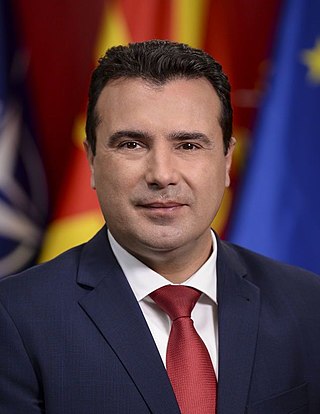
MI5,officially the Security Service,is the United Kingdom's domestic counter-intelligence and security agency and is part of its intelligence machinery alongside the Secret Intelligence Service (MI6),Government Communications Headquarters (GCHQ),and Defence Intelligence (DI). MI5 is directed by the Joint Intelligence Committee (JIC),and the service is bound by the Security Service Act 1989. The service is directed to protect British parliamentary democracy and economic interests and to counter terrorism and espionage within the United Kingdom (UK).

Counterintelligence (counter-intelligence) or counterespionage (counter-espionage) is any activity aimed at protecting an agency's intelligence program from an opposition's intelligence service. It includes gathering information and conducting activities to prevent espionage,sabotage,assassinations or other intelligence activities conducted by,for,or on behalf of foreign powers,organizations or persons.

The Swedish Security Service is a Swedish government agency organized under the Ministry of Justice. It operates as a security agency responsible for counter-espionage,counter-terrorism,as well as the protection of dignitaries and the constitution. The Swedish Security Service is also tasked with investigating crimes against national security and terrorist crimes. Its main mission,however,is to prevent crimes,not to investigate them. Crime prevention is to a large extent based on information acquired via contacts with the regular police force,other authorities and organisations,foreign intelligence and security services,and with the use of various intelligence gathering activities,including interrogations,telephone tapping,covert listening devices,and hidden surveillance cameras.

The Federal Security Service of the Russian Federation is the principal security agency of Russia and the main successor agency to the Soviet Union's KGB;its immediate predecessor was the Federal Counterintelligence Service (FSK) which was reorganized into the FSB in 1995. The three major structural successor components of the former KGB that remain administratively independent of the FSB are the Foreign Intelligence Service (SVR),the Federal Protective Service (FSO),and the Main Directorate of Special Programs of the President of the Russian Federation (GUSP).

The National Intelligence Service (NIS) is the national intelligence agency of Greece. Originally modeled after the United States Central Intelligence Agency,it was established in 1953 as the Central Intelligence Service,specializing in intelligence gathering,counterintelligence activities and securing sensitive state communications.

The National Intelligence Organization,also known by its Turkish initials MIT or MİT,or colloquially as the Organization,is an intelligence agency of the Turkish government tasked with gathering information of national interests. It gathers information for the Presidency and the Armed Forces about the current and potential threats from inside and outside against all the elements that make up Turkey's integrity,constitutional order,existence,independence,security and national power and take precautions when necessary.

The Security Service of Ukraine is the main internal security agency of the Ukrainian government. Its main duties include counter-intelligence activity and combating organized crime and terrorism. The Constitution of Ukraine defines the SBU as a military formation,and its staff are considered military personnel with ranks. It is subordinated directly under the authority of the president of Ukraine. The SBU also operates its own special forces unit,the Alpha Group.

The National Intelligence Service is the chief intelligence agency of South Korea. The agency was officially established in 1961 as the Korean Central Intelligence Agency,during the rule of general Park Chung Hee’s military Supreme Council for National Reconstruction,which displaced the Second Republic of Korea. The original duties of the KCIA were to supervise and coordinate both international and domestic intelligence activities and criminal investigations by all government intelligence agencies,including that of the military. The agency’s broad powers allowed it to actively intervene in politics. Agents undergo years of training and checks before they are officially inducted and receive their first assignments.

The Internal Security Agency is Poland's domestic counterintelligence and security agency. The ABW is responsible for analyzing,reporting and preventing threats to Poland's internal security,including terrorism,foreign espionage,arms smuggling,drug trafficking,organized crime,corruption and economic coercion. Its powers include arresting individuals,conducting searches and investigations,and combating terrorism with a specialized armed anti-terrorist force.

The Directorate General of Forces Intelligence,commonly known by its acronym DGFI,is the defense intelligence agency of the Bangladesh Armed Forces,tasked with collection,collation and evaluation of strategic and topographic information,primarily through human intelligence (HUMINT). As one of the principal members of the Bangladesh intelligence community,the DGFI reports to the Director-General under the executive authority of the head of government,the Prime Minister,and is primarily focused on providing intelligence for the Prime Minister,the Cabinet of Bangladesh,and the Armed Forces of Bangladesh.
The Special Detective Unit (SDU) is the main domestic security agency of the Garda Síochána,the national police force of Ireland,under the aegis of the Crime &Security Branch (CSB). It is the primary counter-terrorism and counter-espionage investigative unit within the state. The Special Detective Unit superseded the Special Branch,which itself replaced the older Criminal Investigation Department (CID),which was founded in 1921. They work in conjunction with the Defence Forces Directorate of Military Intelligence (J2) –Ireland's national intelligence service –on internal matters. The unit's headquarters are in Harcourt Street,Dublin City.

Gjorge Ivanov is a Macedonian politician,who served as the 4th President of North Macedonia from 2009 to 2019.

Zoran Zaev is a Macedonian economist and politician who served as prime minister of North Macedonia from May 2017 to January 2020,and again from August 2020 to January 2022.

The General Directorate for Territorial Surveillance,is the civilian domestic intelligence service of Morocco. It is tasked with the monitoring and anticipation of potentially subversive domestic activities.

The 2015 Kumanovo clashes,also known as Operation Divo naselje,were series of shootouts which erupted during a raid between the Macedonian police and an armed group identifying itself as the National Liberation Army (NLA). They began on 9 May 2015 in the northern Macedonian town of Kumanovo. During the shootings,eight Macedonian policemen and 14 of the militants were killed,while 37 officers were wounded and hospitalized. The shooting ended on 10 May 2015,in an operation by the Macedonian police and armed forces,in which 30 militants were arrested and charged with terrorism-related charges by the Macedonian authorities.
In May 2015,protests occurred in Skopje,Republic of Macedonia,against the incumbent Prime Minister Nikola Gruevski and his government. Protests began following charges being brought up against Zoran Zaev,the Social Democratic opposition leader,who responded by alleging that Gruevski had 20,000 Macedonian officials and other figures wiretapped,and covered up the murder of a young man by a police officer in 2011. A protest with up to 2,000 attendees occurred on May 5,seeing clashes between activists and police.

Early parliamentary elections were held in Macedonia on 11 December 2016,having originally been planned for 24 April and later 5 June.

In April 2016,protests began in the Republic of Macedonia against the incumbent President Gjorge Ivanov and the government led by the interim Prime Minister Emil Dimitriev from the ruling VMRO-DPMNE party. Referred to by some as the Colorful Revolution,the protests started after the controversial decision by President Gjorge Ivanov to stop the investigation of former Prime Minister Nikola Gruevski and dozens of politicians who were allegedly involved in a wiretapping scandal. The demonstrations were organized by "Protestiram" and supported by a coalition led by the Social Democratic Union of Macedonia and other opposition parties,in addition to the newly formed Levica demanding that the government resign and be replaced by a transitional government and that the parliamentary elections planned for 5 June 2016 be cancelled,on the grounds that the conditions for free and transparent elections were not in place. The government and its supporters,who had organized pro-government rallies,maintained that the elections on June 5 were the only solution to the political crisis,with some observers blaming the opposition for creating a "Ukraine scenario" in Macedonia.
Storming of the Macedonian Parliament,also known as Bloody Thursday occurred on 27 April 2017,when about 200 Macedonian nationalists stormed the Macedonian Parliament in reaction to the election of Talat Xhaferi,an ethnic Albanian,as Speaker of the Assembly of the Republic of Macedonia. It was the biggest attack in history on a Macedonian institution.

The National Intelligence and Security Service (NISS) is an Intelligence agency of the Ethiopian federal government tasked to defend,protect and advance the National Security and Interests of Ethiopia. It collects,analyze and disseminate intelligence for decision makers. It also is one of two national law enforcement agencies,in Ethiopia next to the Federal Police Commission. It tackles drug trafficking,cybercrime,arms trafficking,human,and other domestic or international organized crime.

















